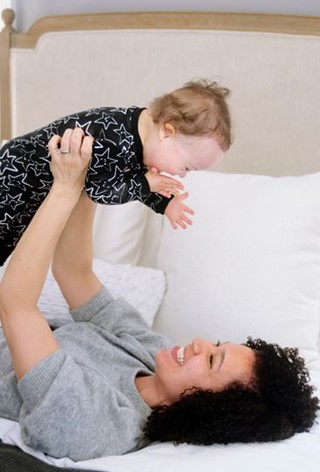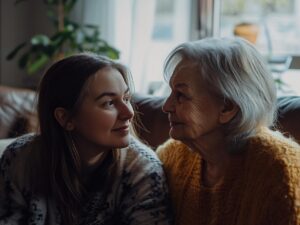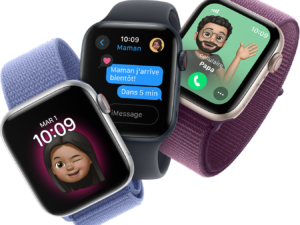Julie is every woman. She has a satisfying career. She has a loving husband and supportive family. She is a mother of two beautiful sons, with a third child on the way. She sounds like she has it all, but not everything is as it seems. Julie has always taken her mental health seriously with a history of mental health issues in her family. She overcame adversity in her life, so she wasn’t expecting anything out of the ordinary when she became pregnant the first time. But she was going through a stressful period and turned to Women’s College Hospital’s Reproductive Life Stages program for help.
Julie had the tools that she felt that she needed, thanks to the program, to get through her second pregnancy. She had complications though, and her second son, Oliver, was born with Down Syndrome and had a host of other health issues that sent Julie spiraling. Knowing that she needed help, she once again turned to the Reproductive Life Stages program.
On September 27, Julie is (virtually) doing the Run for Women, brought to you by the LOVE YOU by Shoppers Drug Mart program to support the Reproductive Life Stages program that has helped her so much. This is Julie’s story.

Tell us about your journey with your first pregnancy.
When I became pregnant for the first time, I experienced a range of emotions, and I was diagnosed with generalized anxiety. During pregnancy, there are always a range of hormonal issues. I was at a busy time in my career with a high stress job. [My husband and I] were house hunting. On top of that, my father-in-law received a terminal cancer diagnosis. For the first time in my life, I felt like I couldn’t cope. I’ve had tragedy and adversity throughout my life, but I knew that this was different. I prioritized it knowing the impact that it would have on my unborn baby. I was thinking about the fact that I was just starting this family with my husband. It was a crazy time and I think that was the start of it. I lost my sense of self. It was a fear of mine, when I became pregnant for the first time.
I was raised by a single mom. I always valued my sense of independence and I felt a lot of that got blurred with all of the changes that were happening with my life. I reached out through my family doctor and I learned about Women’s College Hospital’s Reproductive Life Stages Program. At the time, I think because I was proactive, that it helped my pregnancy. I was able to nip it in the bud early on. They gave me a lot of tools and resources to be able to address and cope with what I was going through.
Once I had my first son, we moved into our house, things started to settle down and I was feeling much better.
You were under a lot of pressure both before and after you gave birth to Oliver. Tell us about what you were experiencing at that time?
I was having some complications during my second pregnancy, but I wasn’t fully aware of what was happening. It was a personal decision that my husband and I made not to have prenatal testing. We didn’t do it with my first baby and it wasn’t going to change anything with the second pregnancy. I had some suspicions throughout the second pregnancy though, but life got in the way. I felt like I was coping well, I knew more about what to expect. I was able to go back to work in between so I was feeling more confident. Even though I had suspected that something was wrong, call it mother’s intuition, it wasn’t until the moment that my son was born that I felt blind-sided. I was induced at 37-weeks and they couldn’t tell me conclusively that there was anything wrong. At first even the nurses didn’t know – Oliver didn’t present. I had to wait three days for the bloodwork to come back, but I knew. I was devastated. It was an immediate wave of grief that just took over.
From the day Oliver was born, finding out that he had Down Syndrome which I knew very little about because the diagnosis wasn’t confirmed before, it got harder and harder. Add to that all of the medical complications that we were ignorant to. He needed open heart surgery at 9.5 months and he had a rare form of epilepsy. We dealt with so much in terms of his health. When he was born, I was literally going from my recovery room to the NICU to check on him the whole night. It was terrifying and traumatic.
I was struggling with the long-term implications for our family, grieving the loss of what I had hoped would be a healthy child. In addition to that, there were all of the hospital visits and medical appointments….add to that my hormones dipping. When Oliver was three months, I reached out again [to the Reproductive Life Stages Program] knowing that I had benefitted from it in the past and I quickly got a referral. I knew that there were some risks for me having postpartum depression [although I wasn’t formally diagnosed with it after my first son was born] and I needed to do something quickly. This time, I received a formal diagnosis of postpartum depression. From then on, it was just a journey back to finding myself. It was a slow process, almost a year. I got on medication to treat my depression and I also had counseling sessions with a social worker. That really brought me back to myself during the hardest year of my life.
One of the biggest things that I got out of that experience of feeling so lost, alone and isolated was being able to overcome that and find myself again. Honestly, looking back, I never thought I would go through another pregnancy.
Did you have testing done with your current pregnancy?
I did and everything looks normal which is a relief. My husband and I just want to be prepared. With Oliver, it was something that I suspected, but never confirmed and I didn’t want to be blindsided. Plus, our family is expanding, and we just need to know how to prepare for it all.
People going through post-partum depression and other mental health issues need a strong support system. Tell us about yours.
Through all of this, my biggest support has been my husband. I think in getting married and making the decision to have kids that you are in it together. Initially, that was because everything was related to issues that we were sharing in terms of the house-hunting and his father becoming ill. He really became my confidante through all of my insecurities and fears during the first pregnancy, because he was scared too. He was also my ally through all of the issues that I was facing through that first pregnancy.
After Oliver was born, there is a picture of us, and we both look so exhausted. Through the last weeks of my pregnancy, when I was going through daily ultrasounds, I would call my husband crying because I’d have to go back again or they would have to induce me, and I was terrified. He was my support throughout that process. After that, he was experiencing the same fears and grief that I was as a parent with a son that was not only born with Down Syndrome but that had other scary medical complications.
Expanding beyond that, my immediate family, especially my mom, has always been such a strong support. It took some time to share the news with our broader network of friends – there was some fear and anxiety over that, but they help too.
You credit the counselling and support from the Reproductive Life Stages Program at Women’s College Hospital for giving you the resources and tools you needed to come out on the other side. Tell us about your treatment path and what resources and tools that you found beneficial?
I think the biggest thing for me was just having someone to talk to and knowing that I wasn’t alone because I was just feeling so isolated. Oliver had been admitted to Sick Kids after an echocardiogram, which is routine procedure. He ended up on oxygen in the Pediatric Intensive Care Unit for the better part of a week and he was in the hospital for three weeks – and this just came out of left field. I remember in that three-week period, I had one or two scheduled appointments, but I would walk up Hospital Row and call my counsellor saying that I needed to come to Women’s College Hospital because I had a panic attack in the stairwell. They were always so accommodating and responsive.
One of the hardest things was feeling isolated and helpless before I got the help that I needed. I remember sitting in the room with my counsellor for one session. I had this laundry list of things to be sad about, and I had this balled up tissue that I went to throw in the trash, and it was just over-flowing with Kleenex. Then, I knew that I was one of many women sitting in that same spot, maybe with similar issues, maybe not. But the point was, that I wasn’t alone in what I was feeling or going through. Somehow, it was reassuring to know that.
How has COVID-19 impacted your pregnancy?
For me, personally, being home for the first 12 weeks was in some ways a blessing on those days that I wasn’t feeling well. I did have some anxiety around the kids and the health of my family. It was also stressful when my husband went back to the office and with Oliver being more vulnerable. It is a credit to the program at Women’s College Hospital – I feel like they equipped me to deal with the stress. Going forward I have the tools, have developed that skill to keep myself in check and know when I am slipping down that spiral towards depression. I know when I need to seek out professional support.
I did get in touch with them during this pregnancy, because I was already in the program. I had a couple of phone sessions and it has been more like a maintenance thing. Once you have experienced postpartum depression, the odds are even higher that you will experience it again. I’m on alert and my team that knows me at Women’s College Hospital is on alert for me. It’s great to know that I have that support available.
Why are you doing the Virtual Run for Women?
The Virtual Run for Women is a way to rally around women’s mental health. It’s related to the importance of connecting and to show that as women, in whatever community that we live, no matter how we’ve been impacted and in whatever stage of life we are, that mental health is an important part of overall health.
It’s a chance to celebrate, to share stories, to connect and to promote women’s health. I’ve experienced first-hand the importance of that and what can happen if you are not healthy and going through mental health issues. It’s a way to give back and it’s also a way to connect with other women that have experienced other forms of mental health issues and health issues in general.
What advice do you have for women who may have post-partum depression and don’t know where to turn?
Start small. If you are able to, turn to your immediate support network like a spouse, partner or family member that you trust and can confide in. One of the scariest things is taking that first step in seeking help because it makes you feel even more vulnerable than you already are. Speaking to someone you trust can give you the confidence to take that next step. It may be going to see your family doctor – that was always my starting point after talking to my husband.
It was also knowing that you have to treat it as a health issue like you would for any other health emergency. Just know that there are services that can help you and you don’t have to suffer alone. You are not alone. It is common for women to experience mental health issues, especially around the reproductive life stages, which is the program that I accessed. Take that first step and get that support that you need. Get those people to rally around you and help you reach out to get more support.
Finally, how are your two sons right now?
They are great! My older son started senior kindergarten and Oliver restarted his pre-school program and he is thriving. With every day, I feel more and more hopeful for his future and I see so many possibilities. We want our son to have every opportunity to be happy, sad and independent. It’s about his right to determine his future, he’s an individual, and I want the best for him, just like I want for his big brother. They are both so excited to welcome another sibling. It’s a really exciting time for our family.
To learn more about women’s mental health and perinatal mood disorders including postpartum depression, read our interview with Women’s College Hospital’s Psychiatrist-in-Chief, Dr. Simone Vigod.








